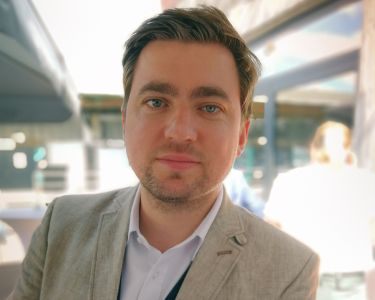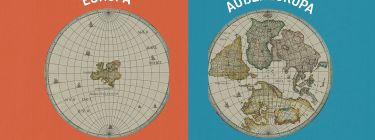
The next renaissance will be globalised
Johannes Ebert, Secretary General/ Chairman of the Board of Goethe-Institut; Nico Degenkolb, advisor for Cultural and Creative Industries projects at Goethe-Institut Head Office, Munich
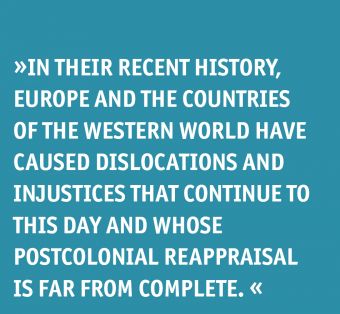
The Next Renaissance Will Be Globalised
Shaping the past, changing the future?
Renaissance, Reformation, Enlightenment, Modernity: these terms for epochs of progress and awakening continue to shape the collective identity of Europe and of the Western world to this day. Their achievements are rightly pointed out and their pioneers and representatives remembered.
However, what has increasingly entered public discourse and thus collective consciousness in recent years is a fundamental ambivalence that characterises Europe’s history of progress in the modern era—on the one hand, a claim to values shaped by humanism, and on the other, a lived practice that all too often contradicts the ideals formulated.
This contradictoriness comes to light especially in Europe’s relationship to non-Europe. On the one hand, the great Enlightenment philosopher Immanuel Kant laid the foundation for the modern, enlightened, Western worldview with the Categorical Imperative and his universalist moral and legal philosophy. On the other hand, he countered precisely this worldview with profoundly racist statements on the supposed superiority and inferiority of Europeans and non-Europeans respectively.1 In 1788, he certified the Native Americans as being „incapable of all culture“ and thus „even lower“ than the inhabitants of Africa. These and other reference points in his work are difficult to reconcile with the idea of universal human dignity postulated by Kant.
Picture above: Ebert_Degenkolb_Videostill from the project Intervention M 21 (www.decolonizem21.info) The (De)Coloni al Glossary, Part 1, Europe – Non-Europe, Copyright: Aliza Yanes & Santiago Calderón
Kant is not alone in such contradictions in thought and action, which have become the subject of critical reflection in recent years. In the most famous passage of the Declaration of Independence of the United States of America, adopted in 1776 as a progressive counter-proposal to Europe’s absolutist ancien régime, on the one hand it is considered self-evident „that all men are created equal; that they are endowed by their Creator with inalienable rights; that among these are life, liberty and the pursuit of happiness”2 — noble ideals. On the other hand, many of the authors and signatories (they were exclusively men), as slave owners, actively deprived people in their immediate surroundings of precisely these rights, not to mention centuries of discrimination against women. The unpleasant downsides were and are not infrequently ignored when progress is mentioned. On the contrary, when it is repeatedly postulated that the Muslim world finally needs an era of enlightenment or that country X or Y must finally democratise for the benefit of its population, the undertone of cultural superiority that can already be found with Martin Luther, Immanuel Kant or Thomas Jefferson often resonates.

In their recent history, Europe and the countries of the Western world have caused dislocations and injustices that continue to this day and whose postcolonial reappraisal is far from complete.
Against this background, do we even want to speak of a New European renaissance? Is there not something deeply nostalgic about the Renaissance concept, as the historian Thomas Tobias Becker recently stated in a lecture?3 „The past was [in the pre-Modern era] the Golden Age, change itself was suspect. If change was wanted, it dressed itself in the garb of return, renaissance, reformation or revolution.” Such a nostalgic understanding of a European renaissance, however, would be backward-looking, Eurocentric and ultimately hostile to progress.
A desirable progressive European renaissance that wants to be more than a nostalgic transfiguration, that rather wants to unfold a great transformational power, must be driven by openness and exchange with the world, by a clear commitment to dialogue and to the
recognition of diversity of cultural practices, by listening to each other and by cultural exchange between the Global North and the Global South. Important pillars of a global renaissance are the ideas of innovation in the cultural and creative sectors as well as the renewal of society as a whole, both within and outside Europe. European external relations and especially external cultural relations play an important role in this.
This is where the Goethe-Institut, the German cultural intermediary organisation with 157 institutes in 90 countries, comes in as an important player in European foreign cultural and educational policy with programmes that promote cultural exchange between Europe and outside Europe. It thus also provides impulses for cultural and creative economy scenes in the sense of the idea of innovation. Some examples of the Goethe-Institut’s programme work are outlined below.
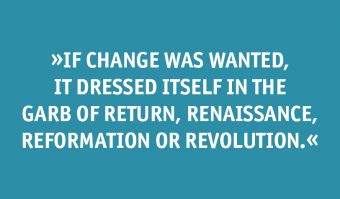
Talk about power structures
The project “Latitude“ invited a global exchange on colonial power relations from September 2019 to November 2021. In interviews, essays, festivals and numerous other formats, topics such as decolonisation, the preservation of indigenous cultures, the role of museums, restitution and the treatment of cultural heritage are negotiated. Latitude refers to the cartographic concept of a demarcation line in relation to the equator, which goes hand in hand with a distinction between the southern and northern latitudes. Through this separation, the term associatively points to inequality in terms of power relations: the imposition of the systematic power of many countries from the global North over regions from the South. Latitude is a space for respectful exchange—cultural, political, economic and aesthetic.
New focal points are regularly added to the Latitude website. Writers like Cidinha da Silva from Brazil and Philipp Khabo Koepsell from Germany, for example, have written essays on „black literature“ and its positioning in the global literature business. The constantly growing number of voices on Latitude can be accessed via a register of experts that makes the participants visible and enables networking among them. In addition, ideas and insights from many Goethe-Institut projects on decolonisation and postcolonial power relations flow into Latitude. The topics range from the return of illegally acquired art objects to the societies of origin and the decolonisation of museums to the redefinition of power relations between the West and the global South and the reorientation of postcolonial development cooperation. For example, the handling of controversial art objects from former colonies is examined from different perspectives, from experts calling for unconditional repatriation as well as from advocates of a broader spectrum of alternative approaches to cooperation between former colonies and colonial powers. These debates are necessary to gain a sense of a decolonised and anti-racist world.
Dealing with the past
Europe can learn a great deal from its past, especially with regard to its relationship with non-Europe. The Goethe-Institut’s „Shaping the Past“ project brings together initiatives from North America and Germany to develop innovative forms for anti-racist and anti-colonialist remembrance in public space. Shared remembrance and the forms it takes are always the subject of controversial discussions, which show that dealing with the past must always be renegotiated. This is all the more true in an increasingly diverse society. In North America, there is great interest in learning about alternative forms of commemorative culture, especially in light of the current debates about removing statues from public spaces. In 2022, a series of exhibitions will be developed with women artists, historians and representatives of the cultural and creative industries to explore innovative forms of remembrance as examples. This exhibition will be produced locally „on demand“ and can be shown simultaneously in various locations, museums and community-oriented venues in the USA and Europe.
Changing societies with games
Enter Africa is a creative African network represented in 15 African countries and initiated by 15 Goethe-Instituts in sub-Saharan Africa. Interdisciplinary teams of architects, urban planners, IT experts and artists in 15 African cities have come together to develop 15 location-based games for smartphones and an analogue mega-game, addressing the challenges of urban transformation, borderlessness and Africa’s past, present and future. This process has resulted in a network of creative, innovative young professionals across the African continent and European-African game developers. Together they use games and game thinking to develop visions for good societies of tomorrow. At the same time, the creative-economic component has also been taken into account.
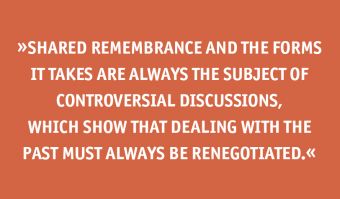
Global knowledge networks
The Covid-19 pandemic physically isolated people from each other worldwide. At the same time, the world also moved a little closer together in the digital realm through the final breakthrough of unbounded communication and learning platforms. The Goethe-Institut as a provider of global learning opportunities also found itself exposed to these opposing dynamics. The possibilities of digital learning, especially in the area of cultural and creative industries, are far from exhausted.
Since 2015, the Goethe-Institut has been testing hybrid formats with the Massive Open Online Course „Managing the Arts: Cultural Organizations in Transition“ and the „Master in Cultural Management“ degree programme run jointly with Leuphana University Lüneburg, in which more than 27,000 participants from more than 190 countries around the world have so far exchanged ideas about the work and the changing conditions of the global cultural sector and the cultural and creative industries. More than 50 lecturers from five continents share their knowledge and create a global learning platform for change through culture. As the academic director of the MOOC Managing the Arts Prof. Dr. Nishant Shah puts it, „What impressed us was how many people were talking in the forum about how culture
affects social change. And how much we need arts and culture to change our society.“ If we want to meet the biggest challenges of this century—climate change, digitalisation, flight and migration—we need many more such globally oriented platforms of mutual learning. For it is these formats that enable discursive spaces for artistic, creative-economic and social innovation.
Europe and the world, or rather Europe in the world, are facing major transformations. The flashes mentioned here are only a small sample of the worldwide work of the Goethe-Institut. They make it clear that the transformations that are in full swing in many places will only succeed if we do not make the mistakes of past renaissances and revolutions again. The next renaissance must not be Eurocentric, nor chauvinistic, nor nationalistic. After the US spoken-word artist Gil Scott-Heron, The Next Renaissance will be globalised.
We can successfully meet the challenges if Europe opens up to the outside world, comes to terms with its past together with other European and non-European states, creates global spaces of exchange and encounter and enables mutual learning. The arts and the cultural and creative industries have a particularly key role to play here—they are the motor and the basis for this next future-oriented renaissance.
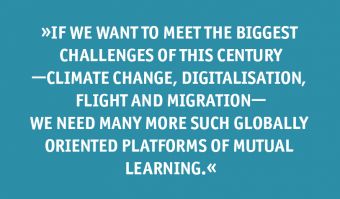
References
1 Kant, AA IX: Logik – Physische Geographie, 1802.
2 American Declaration of Independence, July 4th, 1776.
3 Nostalgie – Geschichte, Theorie, Kritik, symposium Nostalgia and Remembrance at the Leibniz Centre for Contemporary History Potsdam, July, 14th, 2021.
Johannes Ebert
Johannes Ebert is the Secretary General/ Chairman of the Board of the Goethe-Institut. Johannes Ebert graduated in Islamic Studies and Political Science in Freiburg and Damascus and finished a traineeship in journalism. After periods as an instructor at the Goethe-Institutes Prien and Riga and as deputy head of the Public Relations division in the Munich head office, he was director of the Goethe-Institut Kiev from 1997 to 2002. From 2002 to 2007 he was director of the Goethe-Institut in Cairo and regional director for North Africa and the Middle East. Subsequently he served as director of the Goethe-Institut in Moscow and regional director for Eastern Europe and Central Asia from 2007 to 2012, the year he became Secretary General/ Chairman of the Board of the Goethe-Institut.
Picture © Martin Ebert
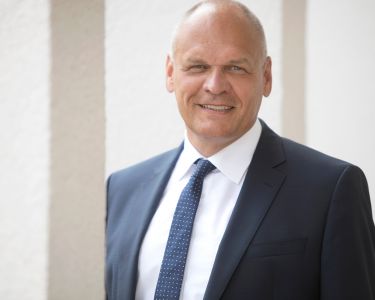
Nico Degenkolb
Nico Degenkolb joined the Goethe-Institut in 2011. He is currently advisor for Cultural and Creative Industries projects at the Goethe-Institut Head Office in Munich. From 2017 until 2020, he coordinated the bid of the City of Nürnberg for the title European Capital of Culture 2025. Nico Degenkolb holds a B.A. degree from European Cultural History from University of Augsburg and University of Seville and a M.A. degree in International Relations from Central European University.
Picture © Krischan Dietmaier
